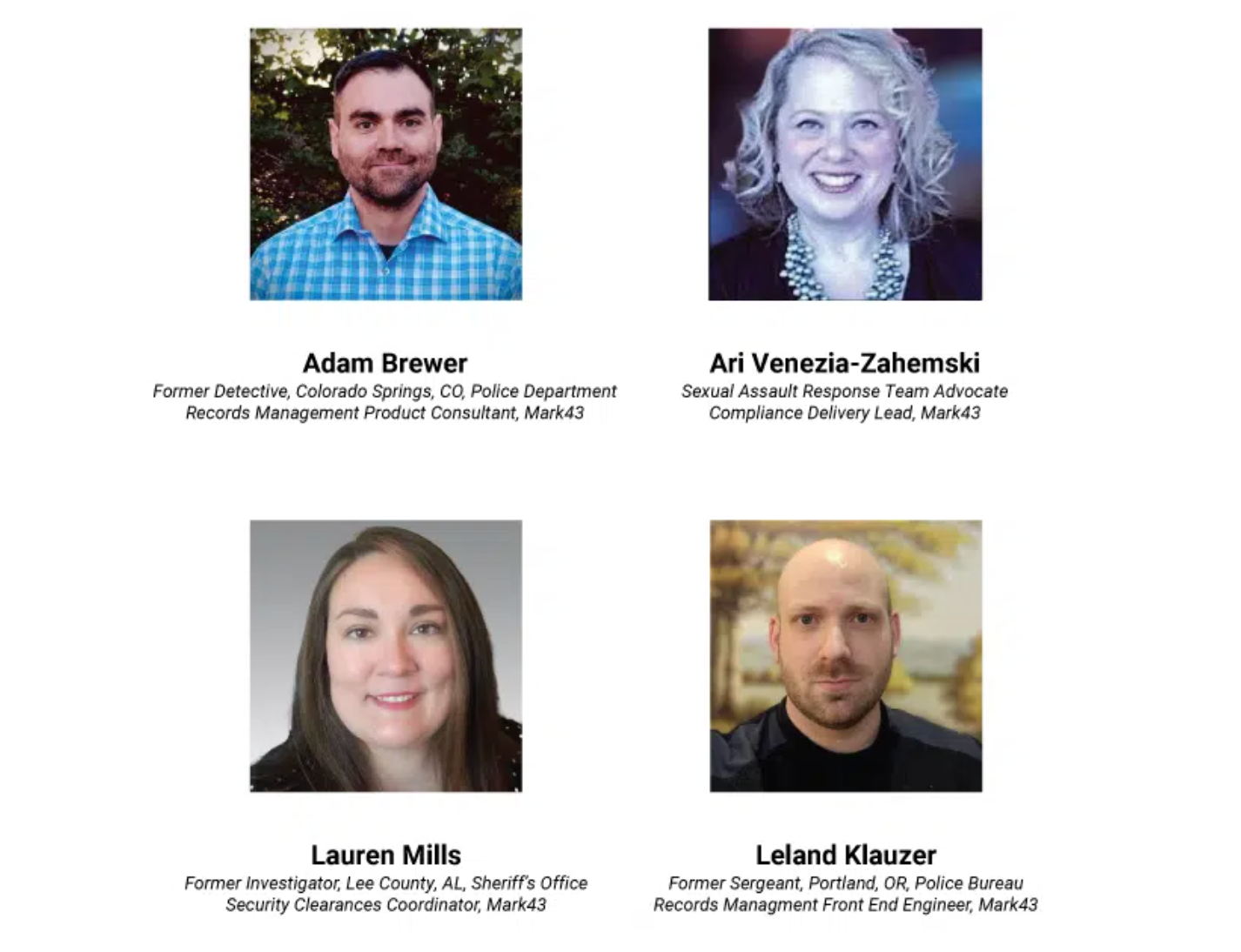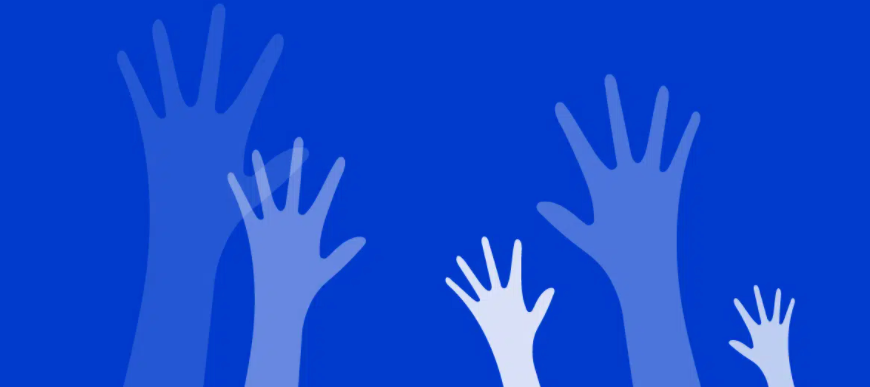There are an estimated 40.3 million victims of human trafficking and involuntary servitude worldwide, according to the International Labour Organization. In the U.S., where the National Human Trafficking Hotline receives more than 50,000 calls, texts, and website tips each year, January is designated as National Slavery and Human Trafficking Prevention Month.
The trafficking of individuals is a horrendous crime, and Mark43 recognizes this crime as complex, dynamic, and one that requires immense resources to address.
I sat down with Mark43 employees who are former human trafficking investigators and current victim advocates to get their perspectives on how trafficking impacts law enforcement, what agencies need to fight trafficking, and which policies help or hinder investigations.

How does human trafficking impact law enforcement?
Adam Brewer: “Human trafficking cases are complex investigations that are emotionally taxing on the investigators, particularly as victims share their stories.”
Ari Venezia-Zahemski: “It can be difficult for victims to tell law enforcement who their traffickers were, which makes investigations more challenging, especially when targeting large networks.”
Lauren Mills: “Law enforcement routinely experiences some of the worst, most heartbreaking parts of society. Human trafficking cases are incredibly complex and cause a mental strain on everyone involved. The lack of regard for human life can make you lose hope that there is good in the world.
There’s also a lack of awareness in the general public to the work trafficked individuals are doing behind the curtain. All of these factors can make it difficult to avoid becoming jaded.”
Leland Klauzer: “Human trafficking provides a source of revenue for criminals, similar to selling drugs or committing robberies or burglaries. The difference is traffickers can sell a victim over and over with less risk.
Victims of human trafficking seldom self-identify as victims and often see their trafficker as someone who loves and cares for them. Traffickers use brainwashing and grooming to influence their victims and discourage their victims from cooperating with law enforcement. Traffickers exploit victims with prior trauma, preying on insecurities and creating dependency. It’s extremely difficult for law enforcement to undo all of that in a short interaction, especially for busy patrol officers running from call to call.”
Reflecting on your experience working human trafficking cases, what was your greatest need?
Adam Brewer: “Assistance with organization. As I found more victims through warrants and interviews the case became increasingly complex. As the complexity of the case increased, I had to stay organized so I could give the right information to the District Attorney for prosecution.”
Ari Venezia-Zahemski: “A survivor advocate. Victims of human trafficking need specialized support for the trauma they endured.”
Lauren Mills: “Resources and personnel. Law enforcement agencies are already spread thin, and human trafficking cases require more people to handle the various tasks associated with the case and resources to share and obtain information. We always needed more people to investigate these crimes and bring those responsible to justice.”
Leland Klauzer: “Patience.”
Every state in the U.S. has enacted some form of human trafficking law, but there are significant differences in statutes across jurisdictions. Given the crime often involves mobility, how do policy variations impede investigatory efforts?
Adam Brewer: “One of the most significant difficulties that I experienced was a lack of multi-jurisdiction cooperation. In some locations, particularly because of the disparity in laws and sentencing, agencies seemed reluctant to dive into an investigation. At times, it seemed like they would not prioritize the case because it didn’t seem like a “big deal” then. This has improved recently as human trafficking is starting to be seen for the horrific crime that it is.”
Ari Venezia-Zahemski: “Human trafficking is often linked to immigration, which is a hot-button issue and requires a delicate touch.
Investigations also require cooperating with federal agencies. Depending on the state and the agency, many different laws, regulations, and policies complicate these situations. The lack of cooperation is, at times, the greatest impediment between agencies, and the policy disparity between jurisdictions can impede investigations.”
Lauren Mills: “The initiatives and laws are always playing catch up. It seems that once government and law enforcement find a solution for one problem, another five problems have popped up in the time it took to create the first solution. Fighting human trafficking is like fighting the hydra from Greek mythology — when you behead one, two more grow from that wound.
That said, officials at all levels are moving in the right direction with every new policy enacted to end human trafficking.”
Leland Klauzer: “There’s a large variance between jurisdictions on how sex work and human trafficking are prioritized and addressed by law enforcement. Additionally, victims are transported between states to disorient victims, enhance the reliance of victims on their trafficker, and keep law enforcement off their trail. FBI and Department of Homeland Security (DHS) task forces help out a lot with this issue by designating Task Force Officers who can enforce federal laws across state lines and maintain lines of communication with jurisdictions across the country”
President Biden’s Administration released the National Action Plan to Combat Human Trafficking that proposes a whole-of-government approach supported by these four pillars: prevention, protection, prosecution, and partnerships. The plan acknowledges that we cannot arrest and prosecute our way out of this crime. In your opinion, what other efforts would best contribute to preventing commercial exploitation?
Adam Brewer: “I think that increasing public recognition that sex trafficking, whether it involves underage or “of-age” victims, is not a victimless crime. The exploitation that victims undergo ensures lasting effects that will require extensive treatment after the arrest of their trafficker. Additionally, consistently improving law enforcement data sharing could increase the number of traffickers arrested and provide better victim outcomes.
Ari Venezia-Zahemski: “Accurate compliance reporting, especially NIBRS, is a powerful way to support the four pillars. The more data about Human Trafficking victims, offenders, locations, and investigations agencies can accurately provide to the FBI, the more resources will become available for law enforcement agencies and the entire spectrum of human trafficking prevention and amelioration organizations as a whole.”
Lauren Mills: “Everyone should actively encourage partnerships between entities that seek to prevent, protect, and prosecute human trafficking cases. We need an increase in communication between law enforcement agencies.”
Leland Klauzer: “Law enforcement needs the trust of trafficking victims. Being heavy-handed with arrests reinforces one of the lies traffickers have groomed their victims to believe: the victims are the ones committing the crimes, and law enforcement won’t help them. I’m a proponent of advocacy efforts, supporting victims of abuse and trauma as early as possible.”
If you or someone you know is a victim of human trafficking, or if you suspect human trafficking, contact:
- U.S. National Human Trafficking Hotline by calling 1-800-373-7888 (TTY: 711), by texting 233733, or via live chat through their website.
- Canada National Human Trafficking Hotline by calling 1-833-900-1010 or via live chat through their website.
- Australian Federal Police at 131 AFP (131237), email human-trafficking-group@afp.gov.au, or through the AFP website.
- U.K. Modern Slavery & Exploitation Helping by calling 08000 121 700 or through the Unseen U.K. website.
- Other international hotlines are available from the European Commission.

